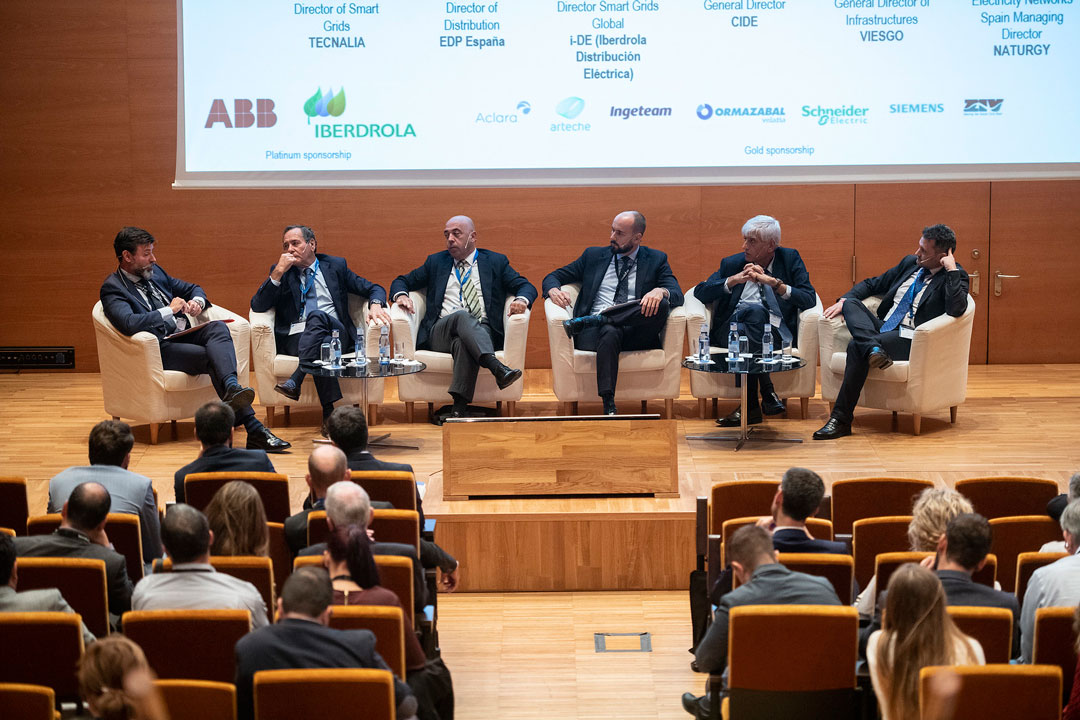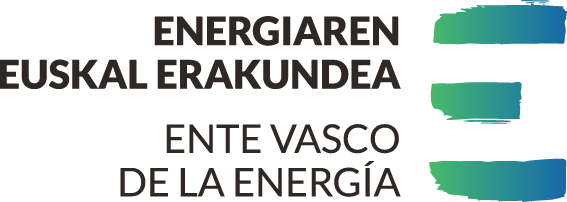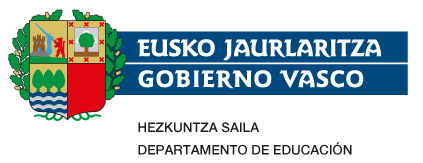
PRESENTATION
Electricity grids are the backbone of the energy system and a key element in ensuring an efficient energy transition.
This congress aims to promote a meeting forum in which experts and researchers from different countries and fields can exchange ideas and discuss the state of the art and the progress in the electricity sector.
The event will pay a special attention to the role of technologies and their impact on the European Green Deal and on the NextGenerationEU program.
Over three half-day sessions we will be able to exchange experiences and opinions about the role that electricity networks play in the energy transition, about the cyber-threats that loom over them, and about the new role of the consumer.

“Energy transition can not be implemented without important or in-depth transformations in the electric networks”
SESSIONS
SESSION 1 · Tuesday, May 10
THE ROLE OF SMART GRIDS IN THE DECARBONISATION AND SUSTAINABILITY OF THE ENERGY SYSTEM
The energy transition focused on achieving a sustainable society is entering a new phase. The urgency of decarbonising the economy has driven important legislative and regulatory changes: the European Green Deal and the “Fit for 55” strategy aim to accelerate profound changes in the energy system and in industry, building or transport, among other sectors.
A broad electrification of energy end-uses will be possible through increased penetration of distributed energy resources (DERs), digitalisation, smarting and automation of energy networks, the development of new infrastructure (e.g. electric vehicle charging points or heat pumps) and the deployment of new measuring equipment to facilitate the participation of active prosumers in energy markets.
The integration of the energy sector with the incorporation of new energy vectors such hydrogen, and the accelerated digitalization of networks and infrastructures will promote a sustainable energy system.
- How can smart grids drive the path to decarbonisation and sustainability?
- How the role of network operators and their business are evolving in this horizon?
- How to continue betting on electrification in a scenario of rising electricity prices?
- How to obtain the maximum complementarity of the co-existence of electricity networks with other energy vectors such as hydrogen?
In this session, high-level experts and key stakeholders will discuss these issues.
SESSION 2 · Tuesday, May 10
KEYS TO CYBERSECURITY AND DATA MANAGEMENT FOR SMART GRIDS
In an electrical business much more complex than just a decade ago, the huge volume of available data is redesigning processes with the aim to facilitate decision-making at all levels. The management of this data is one of the keys to the smart grids evolution and consequently to the energy transformation.
Under this paradigm, there is a need to establish cybersecurity mechanisms that guarantee the integrity, security and privacy of the data generated and transmitted, and additionally the opportunity to organize shared data spaces to maximize their usefulness towards the different applications of the electrical business.
- How can the supply chain be secured at a time when cyber warfare is hitting energy grids?
- How will we move from cybersecurity to cyber resilience?
- How will the new cybersecurity regulations protect the energy sector from cyberattacks?
- What measures in terms of governance and data sovereignty should the Data Spaces adopt?
- How to protect user privacy in data sharing for network management?
These will be some of the issues that will be addressed in this block of expert presentations in the field of cybersecurity and data management, exchanging knowledge, learning and future trends with a solution-based approach.
SESSION 3 · Wednesday, May 11
THE ROLE OF THE NEW USER OF THE ELECTRICITY SYSTEM AND ENERGY COMMUNITIES
The electricity distribution network is undergoing a transformation process: from a traditional model of centralized generation and unidirectional consumption to a decentralized and multidirectional model. In this process the old consumer, passive and not paying attention to the market, evolves into a proactive consumer who manages his consumption and his generation by reacting to market price signals.
This change in consumer behavior is driven by different European directives that give consumers a greater capacity to act in the electricity system and that encourage their association or grouping in the so-called “energy communities”, which offer environmental, economic or social benefits to their members – people, municipalities or small businesses – or to the local areas where it operates.
- What are the changes in the energy system related to the active consumer and energy communities?
- What are the legislative and technological developments needed to drive these changes?
- How are distributed generation and electric mobility integrated into this model?
- How is the development of the Energy Communities evolving in Europe?
- What can we learn from some success stories?
This congress will deal with the most relevant aspects related to these issues such as distributed generation, intelligent consumption management, storage, the aggregation of generators and consumers, or the promotion of microgrids, among others.
PROGRAMME
TUESDAY, MAY 10th – DAY 1
WEDNESDAY, MAY 11th – DAY 2
8:30 - Reception and registration
9:00 - Congress opening
- Iván Martén. Chairman of the Board of Directors. Orkestra
- Jesús Valero. General Management. TECNALIA
- Iñigo Ansola Kareaga. General Management. EVE
9:30 - SESSION 1. The role of smart grids in the decarbonisation and sustainability of the energy system
Smart grids and the European Green Deal
Moderator: Jorge Fernández. Energy Lab Coordinator. Orkestra
- Ignacio Asenjo. Policy officer (Renewables and Energy System Integration Policy Unit). DG Energy European Commission
- Miriam Bueno. Subdirectora General Prospectiva, Estrategia y Normativa en Materia de Energía. Ministerio de Transición Ecológica y Reto Demográfico
- Sergio Martínez Guzmán. Senior Energy Expert. European Investment Bank
- David Robinson. Senior Research Fellow, Oxford Institute for Energy Studies and President, David Robinson & Associates
11:00 - Coffee break
11:30 - SESSION 1. The role of smart grids in the decarbonisation and sustainability of the energy system
Technology development trends. Decarbonisation and sustainability
Moderator: Yolanda Fernández Montes, Environment, Sustainability, Innovation and Climate Change Director. EDP
- Arina Anisie. Analyst – Renewable Energy Innovation for Developing Countries. IRENA
- William Brent. Chief Marketing Office. Husk Power Systems
- Marcelino Madrigal. Division Chief Energy, a.i. Inter-American Development Bank
- Ivo Pothof. Specialist Renewable Energy and Industrial Flows. Deltares
- Pauline Henriot. Energy Policy Analyst. International Energy Agency – IEA
13:30 - Networking lunch
15:00 - SESSION 2. Keys to cybersecurity and data management for smart grid
Digitalisation, cybersecurity, artifical intelligence, data sharing: round table with equipment manufacturers
Moderator: Nico Arcauz. Global Digitalization Director. Iberdrola Nertworks
- Alireza Bozorgmir. Cybersecurity Business Consultant. Schneider Electric
- Iñigo Cobelo. Research Director. Aclara-Hubbell
- Óscar Fernández de Retana. R&D Director. Arteche
- Peter Rietmann. Global Product Manager. Hitachi Energy
16:30 - Coffee break
17:00 - SESSION 2. Keys to cybersecurity and data management for smart grid
Digitalisation, cybersecurity and data management for smart grids: projects and applications
Moderator: Eugenio Perea. Head of Digital Energy. TECNALIA
- Dr Philippe CALVEZ. R&D Lab Manager – Lab CSAI – GAIAX Lead for ENGIE
- Roberto Cascella. Head of sector – Technology supply chain & strategic autonomy. ECSO – European Cyber Security Association
- Sonia Jiménez. Senior Consultant, Programme Management. IDSA – International Data Spaces Association
- Victor Gardrinier. Co-founder. Solarmente
18:30 - End of the first day
9:00 - SESSION 3. The role of the new user of the electricity system and energy communities
Energy Communities, development and success stories
Moderator: Guillermo Basañez-Unanue. Head of Studies of the Department of Studies and Planning. EVE
- Alicia Carrasco. Executive Director. ENTRA
- Luis Arturo Hernández Salmerón. Head of Innovation Domain, Energy Communities & Networks. E.ON
- Ludwig Karg. CEO. BAUM consulting
- Lorenzo Kristov. Electric System Policy & Market Architect; former California ISO
- Chris Merveille. REScoop.eu representative and European projects team coordinator, GoiEner
11:00- Coffee break
11:30 - SESSION 3. The role of the new user of the electricity system and energy communities
Round table – Innovative solutions for the final customer participation
Moderator: Irene Bartol. Secretaria General. ASEME
- Iker Marino. Energy Storage Project Manager. Ibil
- Eduardo Pedrosa. Managing Director Transmission & Distribution. Ingeteam
- Marcello Pomponi. Europe Area Sales Director. Siemens
- José Mª Torres. Director Smart Grids BU. Ormazabal
13:00 - Closure
- Javier Marqués. Technical Director. EVE
- María José Aranguren. General Manager. Orkestra
- Jose Luis Elejalde. Director of Energy, Climate and Urban Transition. TECNALIA
13:30 - Break - Networking lunch
15:00 - VISIT - GLOBAL SMART GRIDS INNOVATION HUB IBERDROLA
Transfer and visit to Iberdrola’s Global Smart Grids Innovation Hub. It is included in the registration of the Conference, but a reservation is mandatory. Please, indicate on your registration form if you wish to attend the visit
The transfer will be made by bus, leaving from and returning to the Euskalduna Palace main entrance













